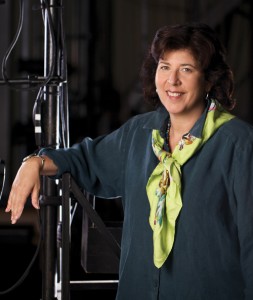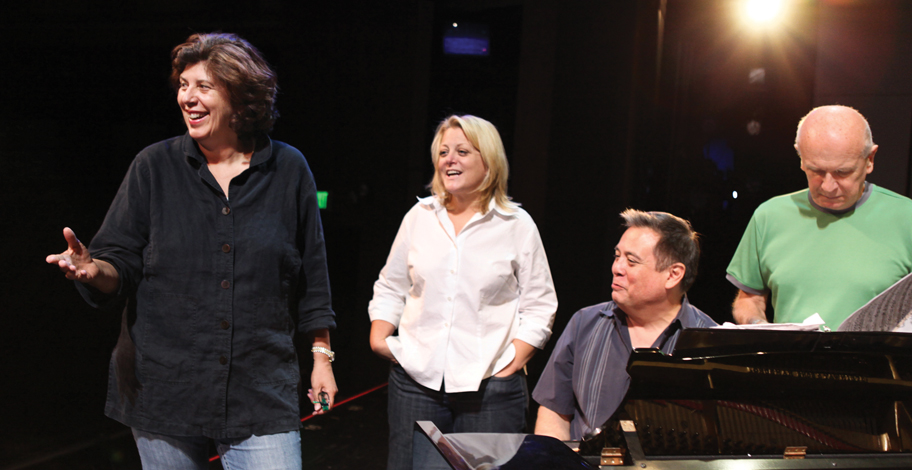
Helming the Ship

Francesca Zambello to direct ‘Show Boat’ for Houston Grand Opera
by Kit van Cleave
The distinguished opera and theater director Francesca Zambello brings her production of Show Boat to Houston Grand Opera in January. Zambello has headed various productions of the Jerome Kern/Oscar Hammerstein work at the Royal Albert, London (2006), Carnegie Hall (2008), and Lyric Opera of Chicago (February 2012).
A beloved American musical that premiered in 1927, Show Boat tells the love story between Magnolia Hawkes and Gaylord Ravenal on her father’s Mississippi showboat at the end of the 19th century. Based on a novel by Edna Ferber, it has been filmed three times, and includes musical favorites (“He’s Just My. . .) Bill,” “Can’t Help Lovin’ That Man,” and “Old Man River.”
After making her U.S. debut as a director with HGO in 1984, Zambello has become a major influence in theater and opera. Often called “the most creative director in opera today,” she was noted by James Taylor in The Economist as “a director without a signature visual style or repertoire.” She experiments, takes risks, and “shrewdly takes on works of epic scale.”
Each year her reputation has continued to grow, resulting in her two present positions—as artistic director of the Glimmerglass Festival in upstate New York, and her new responsibilities (as of September) as permanent artistic director of the Washington National Opera at Kennedy Center in DC, replacing the retiring tenor/conductor Placido Domingo.
At 56, Zambello’s career highlights include work in every major opera house in the U.S. and Europe, a recent Carmen in China, and a directing workshop for women in Cambodia. Prior to arriving in Houston for Show Boat, she directed La Traviata at Opera on Sydney Harbor (March), Aida at Glimmerglass (July), and another Traviata at the Bolshoi (October). Before Show Boat here, she goes to the Metropolitan Opera in New York City for Les Troyens (December), which will run through early 2013.
She has been awarded a Chevalier des Arts et des Lettres from the French government; two French Grand Prix de la Critique awards; the Russian Federation’s Medal for Service to Culture, three British Olivier Awards, and two Evening Standard Awards. Long open about being gay, in December Zambello celebrates the first anniversary of her marriage to attorney Faith Gay.

Kit van Cleave: So what about this “top operatic director of today” reputation?
Francesca Zambello: I blush when I hear this. I do work hard. I am passionate about what I do and want to communicate as best I can with a wider audience.
What is it about Show Boat that engages you?
It’s an American hybrid, a revolution in its time, breaking [new ground with its] music and story. I first did it several years ago in London. As a director, it’s true that I search out shows with big, meaningful stories and complex characters. Musically, I always wanted to bring Show Boat to an opera house, to get the full impact of the work. For me, musical theater is American opera. With it, the U.S. forged a creation as popular as opera was in the 19th century. Opera and musical theater can live harmoniously now, without divisions of genre.
Show Boat really was revolutionary.
Yes, [it was] the beginning of American musical-theater history, which set a benchmark for new ideas to come. Without this show, we would not have had Gershwin, Rodgers and Hammerstein, or Sondheim, nor founded a bridge between opera to our own American art form. Show Boat gives not only a rich study in opera, operetta, vaudeville, and musical comedy, but also—equally important—a compelling American story of social and political importance. Edna Ferber’s story took a revolutionary, clear-eyed look at the sprawling, messy society of the post-Emancipation years, the Industrial Revolution, and conflicts between North and South. These issues, including race, are still with us today. Jerome Kern wrapped Ferber’s tale in joyous, heartbreaking songs, which are now part of the fabric of American music.
Sondheim is so important as a bridge between musicals and opera.
He has shown the level of music, drama, and words can be as sophisticated as in any opera. And in his case, often more so.
American audiences love their musicals—from Oklahoma and South Pacific to the present. Why do you think opera was not as embraced as a popular American art?
Like football, it’s not for everyone. I seek to make it as accessible as possible for as many viewers as possible. We alternate [musicals] with operas at Glimmerglass. But in the beginning of the 20th century it might have had to do with operatic language. Now, of course, [the audience can read the projected] surtitles above the stage for works sung in their original languages.
You have a long history with Houston Grand Opera.
It’s one of my favorite U.S. companies. I actually first came here in 1981 with [director Jean-Pierre] Ponnelle. Then in 1984, HGO gave me my directing debut with Fidelio. I’ve had so much fun and challenge in Houston.
Favorites among your HGO productions?
Salome, Fidelio, Street Scene, Florencia, Faust.
I thought your Billy Budd was brilliant—with the two levels of a ship that showed sailors on both decks. Your concepts do not change the overall work, music, or story, but sometimes you will vary the time and place, or search for a deeper interpretation of characters. This is rather like Orson Welles doing Macbeth in SS uniforms during World War II. Is this what is called “conzeptregie” [or konzeiptregie]?
Sometimes—its merit, when not overused, is a thoughtful and thought-provoking production. I do believe, above all, that the German flip side of this is personenregie, meaning “to focus on the characters.” This, for me, is the most important aspect of directing.
The New York Times ran a large article in its April 29, 2012, Sunday Arts section about the popularity of live opera on the big screens of multiplexes across the U.S. Zachary Woolfe reported that these Live from the Metropolitan Opera broadcasts “are the most important thing to happen to opera since the advent of translated supertitles in the early 1980s.” Do you agree?
Yes, for better or worse. I am concerned that people think HD can capture the live event. Nothing can, except going to a theater and sharing the audience experience with others.
Certainly the audio in these multiplex broadcasts is not equal to hearing the work in an opera house. Given that the 17 broadcast performances last season reached 1,700 theaters in 54 countries, does the audio issue still matter? Or is building an audience more important at the moment?
Audio does matter, but what is most important is experiencing it live—the communal experience of sitting in a theater with other people, sharing the excitement. I love movies, but they are a passive entertainment. People sit in the theater and absorb, but can’t share the excitement of real people performing live, right in front of the audience.
After staging Show Boat previously,
what are you expecting from this HGO production?
I’m delighted that nine-time Emmy Award-winner Tommy Tune is going to play Cap’n Andy Hawkes. I’ve so long admired his work as a performer, director, choreographer, and general living theatrical legend. To have the chance to collaborate at HGO on Show Boat will be great. I’m sure Tommy will bring a unique, fresh perspective to the production. And as he’s from Houston, it will be a shared “homecoming” for both of us.
What else are you looking forward to here?
Wonderful Mexican food and two-stepping.
_____________________________
SIDEBAR
Foreign Tongue
Among her other talents, director Francesca Zambello is ‘quintlingual’
I was introduced to Francesca Zambello by Jack Mastroianni in 1984 as she was making her American directing debut with Fidelio for Houston Grand Opera. Mastroianni was development director for the most forward-looking of the major American opera companies at that time (The Metropolitan Opera in New York, Chicago Lyric, San Francisco, and Boston). HGO’s young impresario, David Gockley, encouraged new operas, new ideas, new singing actors, new directors and designers, and excited ’80s audiences and national media.
Zambello had been an assistant to the director Jean-Pierre Ponnelle, whom I considered a genius. His black-and-white Traviata, starring the brilliant singer/actress Catherine Malfitano as Violetta, is still the most revolutionary and beautiful production of the work I’ve ever seen.
Being close to HGO at the time, I attended Fidelio rehearsals and spent time with Zambello. She is very tall, imposing, and even at age 27 had as vast and swift an intellect as I’ve ever known. All kinds of topics are in that brain—opera, theater, film, languages, books, travel, great thinkers she has known, world-class artists she has worked with. An engaging conversationalist, she’s warm and friendly, funny and open, but firm about her high professional standards.
As I was driving her to lunch at Kim Son one day, I asked how many other languages she spoke, and she said, “Oh, French, Italian, German, and Russian.” But as we began our lunch at the Vietnamese restaurant, Zambello ordered for both of us—in Vietnamese.
She recently called me from Moscow to chat about her latest activities for this article.
Kit van Cleave is a freelance writer living in Montrose. She has published in local, national, and international media.











Comments